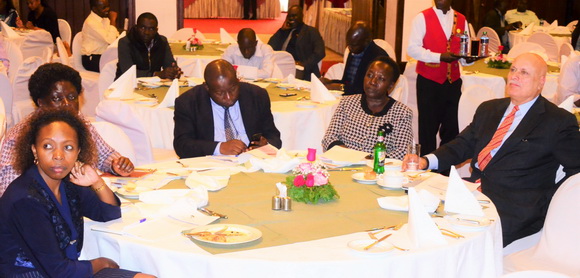
Kenyan Government Banks on Bt Cotton to Revive Textile Industry
April 18, 2018| |
The Kenyan government is banking on adoption of Bt cotton to revive the textiles and apparel industry and increase the contribution of the manufacturing sector to the country's GDP from the current 9.5 percent to 15 percent by 2022. Speaking during a national biotechnology stakeholders' luncheon, adviser on textile value chain at the Ministry of Industry, Trade and Cooperatives Mr. Rajeev Arora said the industry provides a great opportunity for realizing the Big Four Agenda, a government's action plan aimed at accelerating the country's economic growth in the next five years. A cotton taskforce formed in July 2017 was mandated to implement an ambitious roadmap for the introduction of Bt cotton and high-yielding hybrids between 2017-2022.
Arora, who is also a member of the taskforce, remarked that reviving the cotton industry will see an increase in production from the current 5,500 tons to 50,000 tons in the next five years. The government aims at creating 680,000 direct jobs through cotton farming, 210 jobs at ginning level, 6,000 at integrated mills and 25,000 at garments manufacturing. "The revitalization will further create an import substitution of Ksh1.2 billion ($11.87 million) and enhance self-sufficiency of lint," he noted, adding that lint exports will bring Kenya Sh8.75 billion ($86 million) in foreign exchange.
The National Environmental Management Authority (NEMA) has already received an environmental impact assessment (EIA) report for the proposed National Performance Trials (NPTs) on biotech cotton. Addressing the stakeholders, NEMA's Chief Compliance Officer Margaret Njuki said that the public's input into the EIA process is critical in arriving at the final decision on the project. "Giving an opportunity to the public to give their comments on the report is a legal requirement. This also allows them to participate in the conservation and management of the environment," she explained.
The trials will be conducted in nine sites to select best performing varieties for distribution to farmers. Previous research in the country showed Bt cotton yielded three times more than the conventional varieties, providing evidence of its vital role in revitalizing the subsector.
The luncheon, hosted by OFAB Kenya on April 5, 2018, in Nairobi provided insight into the Kenyan government's strategy to revitalize the textile subsector and an update on the status of proposed Bt cotton National Performance Trials (NPTs) in the country.

For more on this and biotech developments in Africa, contact Dr. Margaret Karembu at mkarembu@isaaa.org.
| |
Biotech Updates is a weekly newsletter of ISAAA, a not-for-profit organization. It is distributed for free to over 22,000 subscribers worldwide to inform them about the key developments in biosciences, especially in biotechnology. Your support will help us in our mission to feed the world with knowledge. You can help by donating as little as $10.
-
See more articles:
-
News from Around the World
- Science Enthusiasts Call for Science-based Biotech Policies in Uganda
- Kenyan Government Banks on Bt Cotton to Revive Textile Industry
- Corn Hybrids with High Yields Come with More Variability
- Agricultural Biotechnology Research Center of South Korea Officially Launched
- Experiences on Implementing GM Labeling Laws Tackled in Seminar
- Engineers Discover Bacterium for Greener and Cheaper Biofuel Production
- New Evidence Shows Sweet Potato Came Before Humans; Says No Early Contact Between America and Polynesia
- Scientists from Wageningen University Discover Wild Relative of Tomato Resistant to Many Insects
-
Research Highlights
- Improving Starch Yield of Tobacco Using Cassava Gene ssiv
- Cloning and Sequencing of Two Genes Encoding Methylketone Synthase 2 (MKS2) from Tobacco
- Enzyme from Chinese Tallow Improves Freezing Tolerance in Oilseed Rape
-
Beyond Crop Biotech
- Researchers Develop First Gene Drive Targeting World's Invasive Crop Pest
- Chinese Scientists Improve Microbe's Succinate-Producing Ability
-
Resources
- Genome Editing Infographic
-
Plant
- Cas9 Technology Used to Analyze Role of MORC1 in Barley
- Chinese Research Team Finds Chloroplast Biogenesis Genes in Rice
- NDC80 Protein Complex Responsible for Cell Division in Arabidopsis
- Researchers Increase Lycopene Content in Tomato
-
Read the latest: - Biotech Updates (January 21, 2026)
- Gene Editing Supplement (December 17, 2025)
- Gene Drive Supplement (February 22, 2023)
-
Subscribe to BU: - Share
- Tweet
